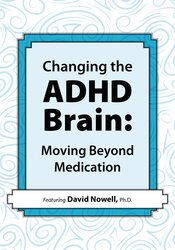

Many persons diagnosed with ADHD prefer not to take medication. There are various reasons for this including side effects and concerns with long-term use. In this seminar, you will learn more about these reasons, as well as alternative interventions for ADHD.
Looking at ADHD from a developmental perspective, we will consider reasons for the apparent increase in ADHD diagnoses over the past two decades. By understanding the way the brain works in ADHD, you will be able to better identify a variety of strategies to significantly impact the nervous system and positively influence symptoms of ADHD in your clients.
Not only will you walk away from this recording with information about some of the most common non-medication interventions for ADHD such as computerized cognitive training, mindfulness meditation and neurofeedback, you will also learn a variety of practical strategies that can be implemented immediately and at low cost.
We will navigate the vast research on exercise, movement, diet, sleep, disruptive technologies, supplements and the impact of the environment on ADHD, summarizing the findings and applying the information to “real life”. You will finish this program with the tools and knowledge to develop a holistic approach to working with adults and children with ADHD.
| File type | File name | Number of pages | |
|---|---|---|---|
| Manual - Changing the ADHD Brain (1.16 MB) | 47 Pages | Available after Purchase |

David Nowell, PhD, is a clinical neuropsychologist in private practice in Northborough, Massachusetts. He offers consultations to patients on an inpatient rehabilitation unit and is an adjunct instructor in neuropsychology to graduate students in the Clark University psychology program. He serves as a physician advisor with the University of Massachusetts Medical School Disability Evaluation Service where he was the former clinical director of the Learning Disability Assessment Program. Dr. Nowell writes a popular blog at Psychology Today on motivation and time management and speaks internationally to clinicians on such topics as executive functioning, non-medication management of ADHD, and applying findings from Positive Psychology.
Speaker Disclosures:
Please wait ...